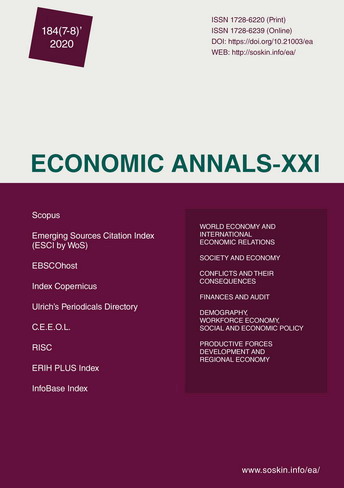The impact of energy consumption on quality of life in the world: methodological aspects of evaluation
The impact of energy consumption on quality of life in the world: methodological aspects of evaluation
Author(s): Olena Makarova, Tetiana Kalashnikova, Iryna NovakSubject(s): Economy, Agriculture, Energy and Environmental Studies
Published by: Institute of Society Transformation
Keywords: Energy Consumption; Quality Of Life; Human Development; Renewable Energy; Clustering; Evaluation;
Summary/Abstract: The high quality of life in the modern sense is directly related to energy consumption and associated with the provision of «clean» food products and environment, comfortable housing, public and private transport. Increasing the availability of energy for the developing countries allows their residents to live longer and more comfortably. At the same time, in the developed European countries with high quality of life, energy consumption is decreasing due to the implementation of energy efficiency and energy saving policies. The Human Development Index, the world’s best-known and most widely used integrated assessment of quality of life, does not include energy consumption indicators. The aim of our research is to study the relationship between energy consumption and quality of life, and prove the need to consider energy consumption indicators in order to improve the methodology framework for assessing quality of life. Using the method of cluster analysis, 77 countries of the world are grouped according to a set of indicators that characterize income, energy consumption, use of renewable energy sources, and CO2 emissions. As a result, the relationship between the level of human development, which is a universal characteristic of quality of life, and these indicators was identified and evaluated.It has been proved that the most prosperous countries in terms of quality of life and energy use are those in which relatively low indicators of primary energy consumption and CO2 emission are combined with high incomes and human development level. The progressive structure of energy consumption ensures the achievement of a higher quality of living, while high energy consumption is not a sufficient condition for this. Against the background of low levels of total primary energy consumption and GDP per capita, CO2 emissions, as well as a low share of renewable energy in total energy consumption, high quality of life is present mainly in the «new» EU member states, which provide it through rational energy consumption. The average level of human development is inherent in a group of countries of the former USSR (which includes Ukraine), as well as some countries in Latin America, the Middle East and Southeast Asia. At the same time, countries such as China and South Korea are reducing energy consumption owing to technological progress and have a positive dynamics of human development indicators. Instead, low levels of energy consumption in the former Soviet Union and Latin America are due to insufficient sustainability of economic and social development, human development in particular. The obtained results substantiate the need to improve the methodology for assessing the quality of life taking into consideration energy consumption indicators.
Journal: Економічний часопис - ХХІ
- Issue Year: 184/2020
- Issue No: 07+08
- Page Range: 29-37
- Page Count: 11
- Language: English

